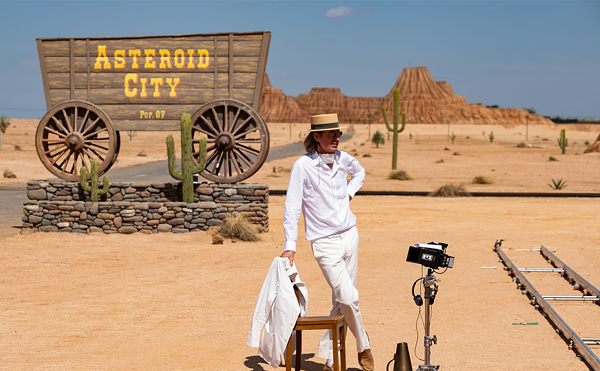No, it's not a joke -- not until the absurd, maudlin third act, anyway -- but rather the essence of Solomon and Gaenor, the feature debut of British television director, documentarian and psychotherapist Paul Morrison. Taking its cues from Jim Sheridan's The Field (coarse, provincial types who lumber around on achingly beautiful hillsides, threatening outsiders) and Sandra Goldbacher's The Governess (young, sexy people of the British Isles who have to pretend they're not Jewish), the movie is lovely to look at, with some superb performances. It also forces its characters to shun simple logic so it can score a bitter, nonsensical downer of an ending. But there's religious persecution and tragedy for you.
Set in and around a Welsh mining town in 1911, the movie introduces us to a depressed and segregated community where jobs are thin and wages slim. Hope and intensely conservative behavior are maintained through the focal point of the church, except for a handful of merchants who form the region's tiny Jewish population. Running a pawnshop and drapery dealer called the People's Store, the Orthodox, Lithuanian, Yiddish-speaking family staunchly maintain their cultural identity while doing business across the ideological fence. From this house emerges Solomon (Ioan Gruffudd), a hopeful lad in his 20s who travels door to door as a peddler drumming his family's fabrics.
Times are tight, but Solomon maintains high spirits, which further ascend once he meets Gaenor (Nia Roberts), the pretty and timid daughter of genteel Gentiles. Instantly taking a shine to her, he proffers a sample swatch of his family's red cotton cloth, then sneaks into the church to observe her singing hymns ... in the standard angelic fashion of softly lit crushes the world around. He's hooked, she's intrigued, and when he burns the midnight oil to make her a "beautiful" (frumpy, but colorful) dress, their relationship takes flight in a furtive kiss. Each has a second language, English, to form a bridge, and, despite their narrow, intolerant households, they find themselves blossoming with good old-fashioned nonpartisan puppy love.
But there's a problem: Solomon has lied. While he was finding his way into Gaenor's favor, he misplaced the truth of his upbringing, adopting the pretense of being English and calling himself Sam Livingstone. Of course, Gaenor isn't concerned with the Diaspora or his place in it, but the deception causes the two to construct a romance on a faulty foundation. Matters are further complicated by her brutish brother Crad (Mark Lewis Jones) and his popular brand of local anti-Semitism and by Solomon's own rude, intolerant father. Yep, it's those issues again, and the two young lovers are forced to sneak away to a hayloft to feast on the proverbial matzo balls and Welsh rarebit.
Happiness is rich but fleeting for the two; their environment crashes in around them -- in the form of layoffs, growing intolerance and the unpleasant, symbolic slaughtering of a family pig -- but especially within Gaenor, who discovers she has a snickerdoodle in the oven. Suddenly all the forced niceties with her parents (William Thomas and Sue Jones-Davies) and the attempts to hide from his own flesh and blood (David Horovitch and Maureen Lipman) tear them apart. Banished from church, unwelcome at home and stinging with romantic anguish, the two find themselves in a position to envy Romeo and Juliet their simple existence.
As the young lovers, Gruffudd (Horatio Hornblower, Titanic) and Roberts (a veteran of Welsh television) make a plausible and moving pair, working to give us unique characters who also represent universal passions. They succeed. What's even more impressive, however, is Morrison's deft balancing act between two seemingly irreconcilable (yet profoundly similar) faiths. It would be easy (and boring!) to take sides in this Jewish/Christian debate, but the director (who also scripted) reveals the staleness, stinginess and spiritual oppression inherent in both patriarchal faiths. A hopeful love meets a vulgar end in Solomon and Gaenor, but the narrative is wise enough to indicate that denial -- not a star or a cross -- is the culprit.





